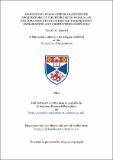Files in this item
Indigenous wildcatters, clandestine prospectors of the petroleum world : an exploratory study of British independent exploration and production companies
Item metadata
| dc.contributor.advisor | Reid, Gavin C. | |
| dc.contributor.author | Stewart, Torcail M. | |
| dc.coverage.spatial | xii, 264 p. | en_US |
| dc.date.accessioned | 2018-06-15T12:09:32Z | |
| dc.date.available | 2018-06-15T12:09:32Z | |
| dc.date.issued | 2005 | |
| dc.identifier.uri | https://hdl.handle.net/10023/14114 | |
| dc.description.abstract | This thesis explores the organizational strengths and competitive strategies exhibited by British Independent Petroleum Exploration and Production Companies. Fieldwork methods were used to obtain new primary source data (quantitative and qualitative) on these companies. These were gathered through a series of semi-structured face-to-face interviews with fourteen Independents, representing a large component of the population and seven international drilling contractors. The research topic is developed along four principal channels of inquiry: 1) Strategic Decision-making Speed and Rapidity of Action, 2) Utilisation of Contractors 3) Negotiation 4) International Strategy. The main organizational strength is identified as the ability of the Independent to be fast in its decision-making speed. In explaining this finding, a range of structural variables are investigated, and shown to be of potential influence. Further, the in-house functional strengths possessed by Independents are examined, and differing reasons for their internalisation are delineated. Another organizational strength is shown to lie in the less formalized approach to business deals adopted by Independents. In particular, the emphasis which Independents place upon developing relationships is found to fit the 'non-ideal' operating disposition of Non-Western government bureaucracies. It is shown that, being free of the inertia which may induce formalized systems and bureaucratic controls in larger firms, the Independent cultivates more flexible systems, which foster its manoeuvrability. A potentially fruitful competitive strategy recognised for such firms is found to be their ability to seize windows of opportunity, in terms of concluding deals. Being small and of limited resources, the international strategy exhibited by several Independents is shown to be one which builds upon existing capabilities. As a consequence, countries where existing company knowledge and experience can be most readily applied, are targeted. Indeed, some Independents' capabilities appear to reside in operating in high political/corruption risk countries. In entering countries often avoided by larger competitors, Independents may reasonably be characterised as clandestine prospectors of the petroleum world. | en_US |
| dc.language.iso | en | en_US |
| dc.publisher | University of St Andrews | |
| dc.subject.lcc | HD9571.5S8 | |
| dc.subject.lcsh | Petroleum industry and trade--Economic aspects--Great Britain | en |
| dc.subject.lcsh | Petroleum industry and trade--Management--Great Britain | en |
| dc.subject.lcsh | Petroleum--Prospecting | en |
| dc.title | Indigenous wildcatters, clandestine prospectors of the petroleum world : an exploratory study of British independent exploration and production companies | en_US |
| dc.type | Thesis | en_US |
| dc.contributor.sponsor | Russell Trust | en_US |
| dc.type.qualificationlevel | Doctoral | en_US |
| dc.type.qualificationname | MPhil Master of Philosophy | en_US |
| dc.publisher.institution | The University of St Andrews | en_US |
This item appears in the following Collection(s)
Items in the St Andrews Research Repository are protected by copyright, with all rights reserved, unless otherwise indicated.

